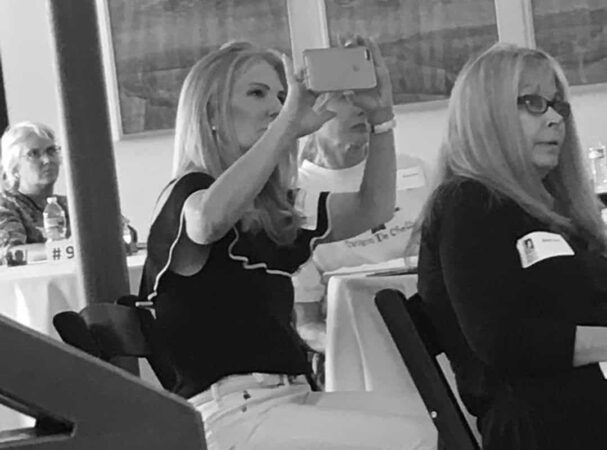It took a long time for me to think like a member of the C-suite. No magazine articles contributed anything, and no business clichés turned out to be gospel. It has been more like Papillon—you can’t just learn the rules and go apply them—because CEOs, like prisoners, don’t live in an organized world of formulaic success; they live in a jungle in which consistency is a veneer and they have to wrestle almost blindly until they know what to eat and drink and what never to touch. Any overly developed philosophy around that experience is missing the point.
The closest analog I have is selling. I teach a course called “Sales Mentality, Conversations, & Culture.” The point is selling isn’t something we’re born gifted at—that’s just something people say to avoid having to rewire themselves to be good at it. Instead, sales requires the cultivation of a particular set of human environmental conditions. If a prisoner says, “Don’t let anyone bully you, because then it never ends,” a salesperson says, “No never really means no; it means not yet.” At a Delta Kappa Epsilon party, that attitude would be sociopathic, but in business it’s part of a highly successful operating system.
Selling is an analogy to leadership and to empowerment over one’s business, because it isn’t a simple playbook of techniques. There are no “Methodists” of the sales world who aren’t actually trying to hawk videos on their methods. Selling requires the acquisition of a set of attitudes and assumptions above all. Selling is an OS for which there’s no reliable manual, just like being a CEO.
CEO thinking—for the artist-CEO in particular—requires extending ourselves, growing into it, moving up from our inner VP, which was probably an upgrade from our inner manager and inner shift supervisor. How we carry ourselves, what we’re prepared for, and what we achieve comes out of our evolving mentality, the direction of our conversations, and the culture we intentionally seek out and foster.
We hear the dictum that CEOs are an expression of ultra-personalism—they’re all doing whatever they want to do, with no rules. They get away with it, we suppose, because they’ve got the job. That’s nonsense. First, they had to give themselves the job in their minds. For longer than we’ve known their names, Steve Jobs, Warren Buffett, Bill Gates, and Elon Musk have had more in common with each other than with the rest of us.
So neither I nor anyone else can lay out the ten things we must all know, think, be, do, or imbibe to become the CEO of our lives. Chicken soup has chicken. Meatloaf has meat. There are also actions we take to ensure that the soup isn’t a sauce and the loaf isn’t a lump. And of course, we mean something objective when we refer to a CEO attitude, but that doesn’t make it quantifiable. The people who do meatloaf well aren’t reading from the meat section of a Betty Crocker kitchen playbook. They’ve developed a sense of it, a feel. Dash of cumin here, bit of celery salt there, and that is what generates the nuance that tastes like home instead of the local sports bar.
The best we can do is describe attitudes that prevail among effective CEOs and reverse engineer the entrée. This is merely my description of what the chicken soup for CEOs looks like for me; it’s my approximation of the dish—my interpretation of the tastes, textures, and aroma. There are better chefs and there’s no doubt I make it differently than someone else would, but I think it’s generally right.
Here’s my operating system. Number one…
I don’t fix myself. I’m right. The world can adjust or not. It will, because I don’t bend on the essentials, and it does. But, if it didn’t, I still wouldn’t. This drives people crazy when they examine it out of context. “You think you’re right!” Well, yeah. I don’t go around thinking I’m wrong. THAT certainly isn’t a recipe for effectiveness. Whichever school, parent, or Midwestern cul de sac trained us to WONDER if we’re okay or not, if we need to change or not, if we have some fundamental flaw or not—those are the “enemies” of CEO thinking. I don’t read self-help books. I don’t read blog posts claiming there’s danger in what I don’t know (“Ten things you’re doing wrong in your business!”), and I don’t think other people have the answers. I think it’s up to me to achieve the answers by doing what I know how to do, not by stopping and questioning whether I’m acceptable in some way. These ideas get marked “arrogance” by some observers, which is why the world is full of people who DON’T achieve their goals but either invest a lot of time whining about why they can’t, consoling those who don’t, or commenting on those who do. As with sales, if we don’t believe in ourselves, no one else will. It’s believe or die.
I don’t question what I do. I already know. This is the next logical outcome. Sure, we’re currently witnessing a political culture right now that’s showing us, on both sides of the aisle, what the sociopathic version of that looks like—demented pulpit-pounding and shrill epithets espousing an ideological certainty too insecure to tolerate dissent. There’s a dark side to everything. But imagine THIS dark side: a person who can’t go outside, make decisions, make commitments, bond with another human, or start any new initiative, because they’re continually questioning whether they can trust their own judgments. We all know someone who dabbles in that, and NONE of them are CEOs. The achiever gets things done because he regards the act of stopping to second guess as friction. The CEO can’t afford that friction. Worry is the adversary. Fear is the mind-killer. Ponder if you like, plan some but only some, then pick a direction and go, and don’t wonder if it is right. It is right at this moment and you’ll adjust as you go. CEOs make effective decisions because they’re always in motion. They AREN’T sitting, waiting to move until they’re sure. Being in motion means that they identify opportunities that everyone else misses. We don’t have time to wonder if we’ve made the right choice, because by the time that could arise, we’re already adjusting on the fly.
I don’t adjust to you. You adjust to me. Adjusting approach can be tactical, but it’s situational. Revising oneself for others is not an option. And the dynamism that propels a CEO isn’t a persona; it’s the intrinsic, authentic self. That is the self that needs to live, and be expressed, no matter what. The inner-VP can afford to suffer obscurity for righteousness’ sake. He or she can agonize over being nice enough and pleasing everyone. By contrast, the inner-CEO is such a high achiever that, short of violating some explicit rule of courtesy or civilized conduct, he is forgiven for having a more than ‘normally’ emphatic personality. He is permitted the impatient desire to move to the most actionable thing, or ask the presumably rude question, “What do you need?” It’s not rude—just direct. I’m here to deliver value; this is what you get with this package. Criticism is endless, but we can never place changing our personality on offer. It’ll have its downsides, but it’s also the essential gear of our success.
Some of my favorite fictional characters are those of The West Wing, Aaron Sorkin’s drama about the White House. It is the kind of work culture in which I want to live out my days. Fairly high-ranking staffers (think VP level) are full of drama, but the highest ranking one next to the president—Leo McGarry, the chief of staff—is imperious, raw, blunt, with no time to waste. His most common words are the same as the president’s: “What’s next?” He’s supremely effective. I only wish I could be like John Spencer’s character; it’s a personal study. For those who love the show, I’m much more like Toby some of the time. So I mentor myself from his inner Director to Leo/Spencer’s inner CEO.
Filter hard. If you expressly ask me for something, I may put it on my list. If you don’t, I won’t drop the ball, because I won’t have picked it up in the first place. I used to study every conversation for things I should do, possible needs I could fulfill. I was incredibly helpful. And I was thinking like a shift supervisor. Sure, I’ll work overtime, even though you didn’t ask. The filter was dialed down too low. Now, I have it cranked up to where occasionally things break. If the request isn’t clear or explicit enough (“Will you look at this?”), you’re not likely to get what you want. “I looked at it. What’s next?” It’s about priorities. The law of constraints says that there’s only so much available time and energy to spend in a given time period. I already have priorities—always. In order to modify them, I need to hear a crisp, clear request for something specific, and a relative level of importance (what’s the impact if I don’t do it), so I can decide where it fits and whether to bump something else down. And even if it’s earthshaking, if I’ve got six other earthshaking things, it may not get added to the list. Sure, some CEO has crawled behind a toilet to fix the leak, demonstrating that he’s invested in the total operation of a business. If he does it three more times this week, fire him. We have janitors; we need this person to lead, if we’re going to hit our goals.
Say no. How often? Whenever possible. There is no amount of too often to say no to things that distract, dissuade, divert, or detract from the objectives at hand. This is virtually the definition of a C-suite member. It’s why fixing the toilet is a stunt and nothing more. The next logical extension of an aggressive filter (not picking up tasks just because no one else is grabbing them) is refusing important tasks that someone else is actively pitching, so we can focus on more mission critical ones. When everything is top priority, nothing is, and we have to reject that in favor of the law of constraints (resources, including time, money, and people, are always finite). No is default. Yes had better be scarce.
The sales analogy is still helpful here. Every time we say “yes” to something, we’ve been sold something. It had better be what we really wanted, our core objective, or a thing that helps us achieve that objective more efficiently. When someone says, “Will you do x?”, they are making a pitch. It’s exactly the same as asking, “Would you like a subscription to Time-Life Books?” or “Can we have your email address so that we can send you our newsletter?” We all know the person with 130 subscriptions to something, because he couldn’t say “no.” His closets are full of foot massagers and machines that make “flower bouquets” out of a fresh vegetable. “No” has to be the default response for the C-thinker. Getting past our “no” ought to feel like pitching a New York City traffic judge on the need to park in a crosswalk for humanitarian reasons.
Everybody’s in my organization. The guy at the store down the street? He’s in my organization. The Uber driver in the front seat? He’s one of my people. The doctor with no bedside manner who told me I might be bleeding internally or else I could just have mild anemia—well, that guy is fired (I can also fire anyone), but he WAS in my organization at the time. In other words, I approach everyone with one and the same set of assumptions. I test ideas with them; I practice sales techniques with them; I even rely on them. If my assumption is “I’m right, who I am and what I’m about isn’t negotiable, and everyone else can adjust,” then that’s true when dealing with the Uber driver, the store clerk, and the doctor. We need to be the same person all the time, even if we have to fight our way there. The mentality, conversations, and culture that we adopt have to form a seamless environment. We have to move, breathe, and live in that environment to be effective. The moment we start thinking that CEOness is something we turn off and on, it becomes an act, and we can’t authentically inhabit it. It’s got to be in the DNA of our identity, like the fat in the chicken soup.
To hell with consistency. This may seem like a contradiction. That’s the point. This is what stokes that notion that CEOs do whatever they want. We don’t OWE anyone else a commitment to being consistent. Maybe a VP does. A CEO says, “Yeah I take out my own garbage, and I hire a guy to sweep my sidewalk, and you can think whatever you like about that.” In other words, we’re accountable ultimately, perhaps even only, to ourselves. We choose—we do—without the need for explanation. After all, we are the ONLY people capable of holding ourselves accountable to our goals. In some sense, all external accountability is fraud. “You called me just the other day,” a colleague might say, and wondered if you’d been too hard on someone.” Yeah, and today five times today I didn’t call, and I didn’t wonder. Consistency is yet one more thing to be subordinate to. A CEO is ONLY subordinate to the goals. Not even to the stockholders. That’s a myth. Stockholders don’t fire a CEO who’s hitting his goals. They lavish everything upon him.
Some will question this breakdown of CEO DNA. But what we can’t afford to question is: our goals are everything. If we don’t agree on that, we’re not describing the same reality anyway. And if we really mean it, there’s therefore no time to ask ourselves if we need fixing, no room to wonder about every decision (so the habit had better be to do the opposite), no bandwidth to consider fitting in or not. The only choice is being an original, OR demoting oneself to being merely the VP of our own life and wondering who’s going to take over the helm and tell us what to do. Being helpful, whenever possible, is criminal to the CEO. Saying yes as often as you can is woo-woo crazy. Switching off—going to bed and waking up two different people—is unsustainable. And worrying about whether we have perfectly executed every ideal all the time is a job for a saint. The CEO takes consistency out on the town but doesn’t marry it.
Some other mix, stew, or body of “wisdom” might have different ingredients. I’ve never understood why people use rice in their meatloaf. Whatever knocks your hair back. But when I look at the other CEO types I’m trying to emulate, the elements I’ve mentioned are some of the ones I see. That includes CEOs of companies that are bigger than most nations, CEOs of their own goals and personal objectives, and many shades in between. The champions. The paragons. The break-out prodigies. This way of thinking doesn’t just work for me—it works consistently for a lot of people. Whatever adjustments we make to our mentality, conversations, and culture so they align our lives with what we want to be alive for, the transformation must be wrought first in the area of attitudes. When it works, when attitudes shift, words and behaviors follow. Then we get to be the CEOs of our lives.







